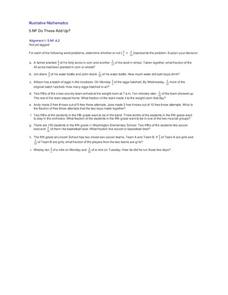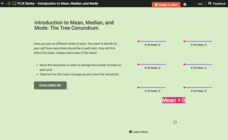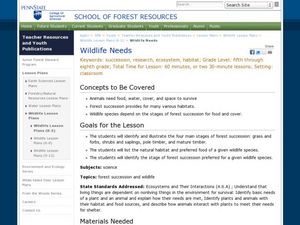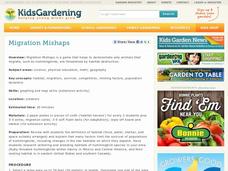Curated OER
Raising Plants
Students investigate the life cycle of plants by growing their own in class. In this botany lesson, students practice using plant vocabulary while they grow their own Wisconsin Fast Plants. Students collaboratively build a light box...
Captain Planet Foundation
Fall into Healthy Shapes
Kindergartners identify geometric shapes by planting a fall garden. They start their seeds in containers that have different shapes, and keep track of their plants based on those shapes. This brilliantly designed and incredibly thorough...
Curated OER
Carrying Capacity
Young biologists identify how plants and animals are affected by changes in their ecosystem and environment. The concepts of succession, maintenance of habitats, interrelationships, and adaptation are all discussed. This well-developed...
Curated OER
Speedy Succession
Fifth graders investigate how a pond ecosystem can change into a prairie or grassland ecosystem. They observe a small pond ecosystem in a two liter soda bottle, and examine and record changes over a two-week period of time on a worksheet.
Curated OER
How Ecosystems Change
In this ecosystem instructional activity, learners will use four pictures showing the animal and plant changes occurring in a particular habitat over many years to complete 5 short answer questions.
It's About Time
Adaptations
Congratulations! You exist, thanks to the wonders of biology and adaptations. The focus of the lesson explains many adaptations of plants and animals and how the environment has influenced the process. A hands-on activity demonstrates...
Curated OER
SOIL
Second graders name the various materials that comprise soil, including weathered rock and other organic matter; and explain that soils differ in their color, texture, capacity to retain water, and ability to support the growth of many...
Curated OER
The Absorption of Solar Energy
Two sequential parts to this lesson introduce your class to the electromagnetic spectrum, the ability to absorb radiant energy, and the pigments in leaves that are responsible for collecting sunlight to be used in the photosynthetic...
Curated OER
Pollination of Flowers by Moths
Turn your classroom into a pollination station as your kids transform into moths or predators trying to survive and aiding in plant reproduction along the way. Using silent party blowers as proboscises, the moths will have two minutes to...
Curated OER
Do These Add Up?
Common Core mathematical practices require that young mathematicians not only know how to add fractions with unlike denominators, but also to recognize when adding fractions are appropriate for the word problem. Fifth graders are given...
CK-12 Foundation
Introduction to Mean, Median, and Mode: The Tree Conundrum
How many trees should we plant? Using an interactive as a manipulative, individuals find the mean, median, and mode for sets of data. They determine the number of trees to plant in each plot of land to reach a statistical goal.
Curated OER
Prairie Scavenger Hunt
Middle schoolers take a close look at the prairie environment. They identify common plants and animals of the prairie. In addition, pupils work in teams in order to put together a presentation on a certain aspect of the prairie...
CK-12 Foundation
Limiting Factors to Population Growth: Graphing Population Growth
If any of the limiting factors in an environment change, both animal and plant populations also change. The video explains two different models of growth and the impact of limiting factors. It highlights the carrying capacity of an...
Curated OER
Grow Your Own Grub
Students study plant needs and growth by completing a gardening activity. In this plant study instructional activity, students watch a video and discuss plant growth needs. Students plant seeds in containers and water the plants....
Curated OER
Wildlife Needs
Students identify the wildlife needs in a specific setting. For this wildlife needs lesson, students identify and illustrate the four stages of forest succession. Students list the natural habitat and food for a given species. Students...
Curated OER
Forest Succession
Students research environmental change and why forests cannot stay the same for long. In this environmental growth lesson, students discuss the life cycle of a tree and examine tree cookies to discover the age of these specimens....
Curated OER
Protoplast Production (Plant Cells Without Walls)
Learners explore the spherical protoplasts of plants. Students observe that plant cells have a plasma membrane in addition to the cell wall. Learners plasma membranes, solutes and organelles.
Curated OER
From Seed to Plant
Students adopt seeds, recording their observations as they draw their seeds, germinate them, and plant their seedlings using the hydroponic method. Students maintain journals recording their germination experiments.
Radford University
Georgia Peaches and California Dreamin’
Plant the fruits of trigonometry. Pairs work through the process of finding the best place to plant fruit trees on a piece of property. The scholars must take into consideration the location of the property and the solar zenith angle. To...
National Gardening Association
Migration Mishaps
Elementary ecologists pretend to be migratory hummingbirds. They fly between wintering and nesting grounds, trying to reach a habitat haven. In a musical-chair fashion, some birds will miss out, and are removed from the game. To further...
Curated OER
Forest In A Jar
Students conduct an experiment using soil, water, seeds, a plant, and a jar; and then draw a poster to represent their observations and findings. They make a poster showing what happened to their aquatic environment.
Biology Junction
Seed Plants: Gymnosperms and Angiosperms
One of the reasons plants found success on land relates to seed development. Scholars learn about many different forms of seeds and how they changed over time. It describes the structure and function of many different types of seeds in...
Curated OER
Communication Skills in Employment Situations
Learners enhance their oral and written communication skill while preparing their interviewing skills. They create landscape designs using appropriate proportion and plant symbols.
Curated OER
The Alphabet Garden
Third graders transplant, tend and observe a plant for each letter of the alphabet in a school garden. They work individually to research and select a plant that will grow in their local climate. Students then care for and observe the...

























